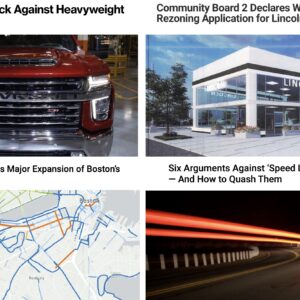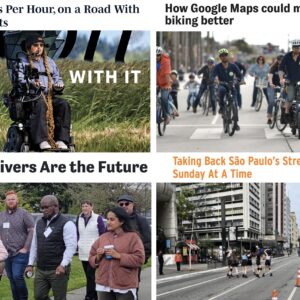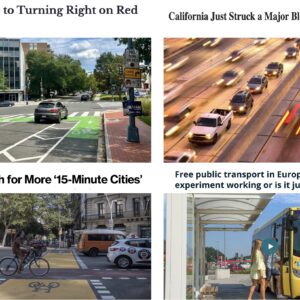Here’s the news that caught our eye this week:
– National organization Bikes Belong is using some of its clout and funding to send U.S. city officials and planners to the Netherlands to bring home lessons in bicycle culture and infrastructure. A reporter followed one delegation and describes what he observed.
– In NYC, bicycling is apparently becoming fashionable among young, chic women, in part as a quaint accessory and in part as a way to stay in shape.
– A popular cross-country bicycle route is slated to become a major freight corridor, with 500,000lb (!) trucks delivering oil extraction equipment to Canada.
– Since Tacoma, Washington passed a master plan that included bicycle infrastructure, it has not only not been implemented on newly repaved and striped streets, but bike lanes have been removed.
– It’s about time the misconception that people who ride bikes don’t pay for roads was put to bed for once and for all. This article out of Vancouver, BC does a great job unpacking the issues. I wrote something about it too, over at Grist.
– In the U.K., perhaps for the first time ever, footage from a helmet camera has helped convict someone of reckless driving in a road rage incident.
– A critical look at ways a city might better serve working class Latinos who commute by bicycle out of necessity and are rarely reached by outreach programs or well represented by advocacy groups or government decisions.
– The folks behind the popular WalkScore.org site have enticingly posted a request for feedback on what a potential BikeScore program should include.
– According to a new study, state bans on driving while texting and using cell phones aren’t reducing crashes.
– Also in the news this week, a social media company is working on a license plate-based social networking scheme so that you can use your phone to connect with other drivers (as well as participating companies) while you’re in traffic.
– In a Portland suburb, a frustrated contractor has begun filling potholes in exchange for donations to charity. The catch? It’s illegal.
– What doesn’t mix? Mountain bikes and guns. Hunters were concerned about the two overlapping in Sisters, Oregon last weekend.
– It’s true, you’re never too old to ride a bike, according to this roundup.
– And finally, the video of the week, from StreetFilms, shows the charming story of how one neighborhood in Queens, NY found more much needed park space…in the street. Inspired to create your own carfree space? Here’s a handy guide.






Thanks for reading.
BikePortland has served this community with independent community journalism since 2005. We rely on subscriptions from readers like you to survive. Your financial support is vital in keeping this valuable resource alive and well.
Please subscribe today to strengthen and expand our work.
Welcome home Elly!
RE: “popular cross-country bicycle route is slated to become a major freight corridor, with 500,000lb (!) trucks delivering oil extraction equipment to Canada.” The major economic incentive for this effort is the ability of the Port of Vancouver (WA) to handle the extremely heavy equipment being unloaded from freighters coupled with a much less demanding overland route than other alternatives. Efforts to devlop the Alberta tar sands have been ongoing since the 60’s. Now that oil prices are rising, it becomes more economically feasible. I’m not so sure that the route will become a major commercial attraction once the heavy equipment deliveries are completed however – there’s really not much out in that direction. Hopefully the states will charge enough for the permits to pay for road repairs once the project is completed.
just read some story debunking the nyc bike chic article…
http://www.slate.com/id/2269270/
I’m thinking that a big part of why the cell phone bans don’t improve safety is that they aren’t enforced, and when they are the penalty is a tiny fine. If texting while driving is as dangerous as drinking and driving then why isn’t the penalty losing your license for a year?
Jim,
The worry about that overland route is that they are making permanent infrastructure changes. Other oil companies have indicated that they’ll use the route as well if Exxon gets the go ahead. The Tar Sands up there are expanding quickly, this route would get a lot of traffic (all benefiting foreign countries)
#2
Fashion “stories” are the only “news” that appeal to a large portion of the female population. As an aside, I helped build the store fronts for Forever 21 in Pioneer Place downtown and Washington Square Mall. We just finished putting up the storefront and all the glass at Tacoma Mall’s humongous Forever 21, which took over an old Nordstrom’s building. They mostly sell cheap women’s trendy fashion. Are clothes the only thing women think about?
It occurred to me that MADD should become MADDD – Mothers Against Drunk and Distracted Driving.
Helmet cams are small insurance against lunatic drivers, as I’ve been saying. Maybe it’ll become a trend, and drivers will behave themselves not knowing which cyclists have an electronic eye out for them.
I’m with Bjorn: Until the penalty for cell phone use is higher, and actually enforced, it’s pointless.
Elly:
Great article over on Grist.
The comments are “O”-lite with every fundie trying to logically and rationationally justify their predjudice against bikes on the road.
HI-larious!
So long as women are still valued more for their appearances in many respects (in general) than their work or achievements in the news, then yes, a majority of women are going to care over much about fashion (in general).
When non-fashion or style new articles stop covering what women are wearing or how they look in ‘real’ news articles as if it matters to the story, it will be a wonderful day.
Last I knew Ambercrombe, Hollister, American Eagle and AA and all those other crap cheep fashion stores all cater heavily towards mens’ fashion as well. Women are not the only ones affected by cheep crap and what is in style.
It’s a rather gross overgeneralization to state that women largely *only* read fashion and style sections of news though.
I definitely enjoyed the grist article. Is it just me or does it seem like the hard numbers for things like that only come up in bike/environmental columns? I think it would be awesome to have a few quick facts about who actually pays for the roads or the percentage of funding that goes to bike infrastructure pasted all over town. It gets annoying hearing the same false statements come up over and over again. But i guess that is the problem with any important issue these days.
Wow, that Alberta oil sands has got me thinking I want to become a petrochemical engineer. With oil deposits second to Saudi Arabia, oil defense wars could be limited and money could be saved. Think of all the bikepaths that could be built with tar from oil sand.
jram:
What is frustrating though is even when the numbers are PRESENTED, people still argue against it like they hadn’t even read the article in the first place.
Studies have shown that is very hard to change people’s opinions, even when presented with hard facts.
Until so many people bike on a regular basis that we are no longer just a fringe minority but also make up a sizable population of people that both ride AND drive, I don’t think the assumptions made by the driving-only public will change.
The “BUMP” social network: yet another reason I’ll stick to bicycling as my preferred mode of transportation and keep my car in the garage.
all i was trying to say was that the NYT ripped off a three year old story from the New York Observer and is trying to make soemthing that is not trendy, trendy.
What steams me about the tar sands story is that I don’t think we (the global we) should be sending the extraction equipment *anywhere*. As I understand the process of tar sands oil extraction, it seems terribly destructive- especially in the wasteful use of water- just to squeeze out a few more years of driving. But I admit I’m prejudiced; I like driving less than I like having clean water.
This article in today’s Columbian is about the Port’s handling of tar sands equipment:
http://www.columbian.com/news/2010/oct/04/port-of-vancouver-oil-sands-cargo/
Interesting is the fact that, though the only local involvement is limited to offloading equipment and xferring it to barges, many comments even from Vancouver residents are negative.
Realistically, the tar sands are going to be developed whether some like it or not.
Cell phone restrictions don’t reduce crash rates!!!??? Not only is this very surprising, it’s terribly disappointing. Hope this turns out not to be the case.
it takes alot of energy to extract and refine sands oil. Very thick and dirty oil. Most current refineries cant handle that kind of oil. They needs to be upgraded/retooled/rebuilt to work with it. It could be more expensive. More pollution, etc…. So bicycle could become king of the world.